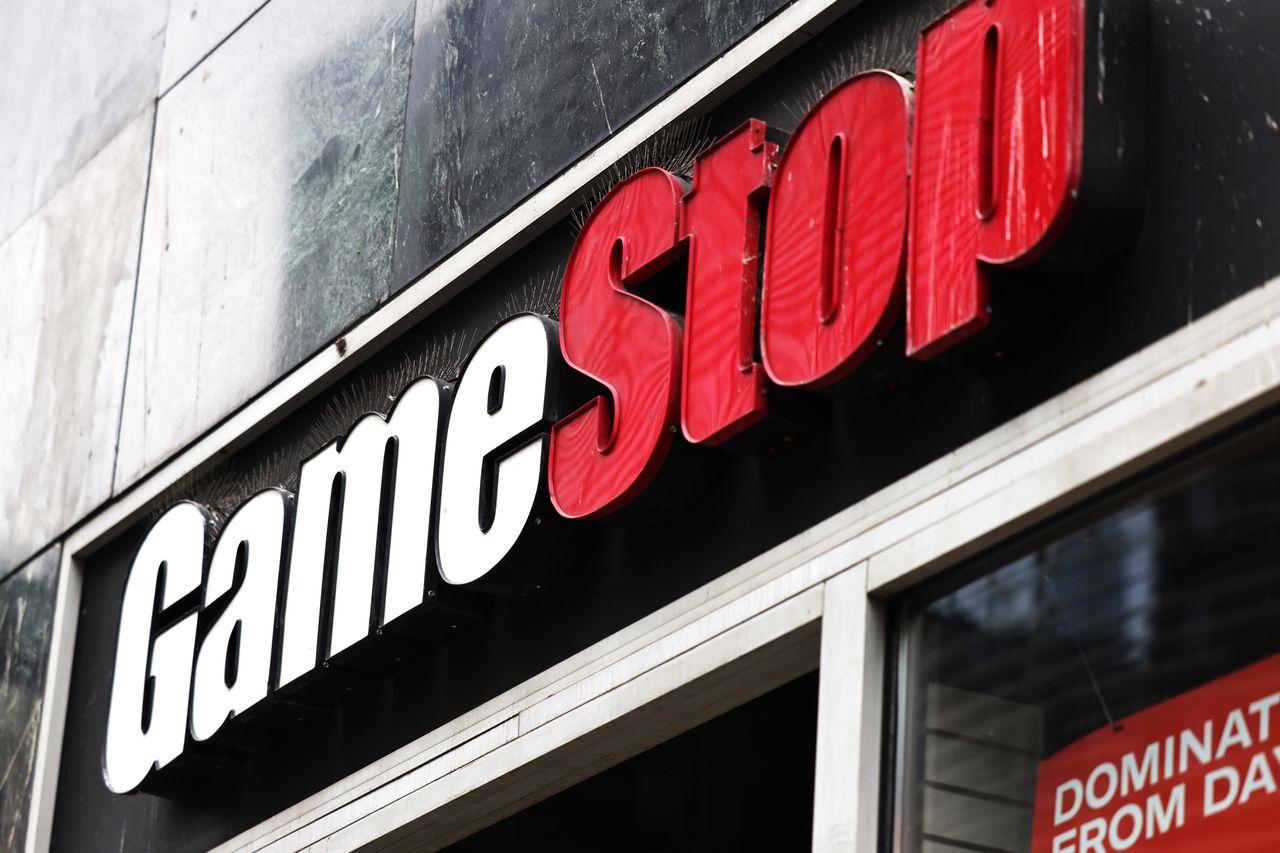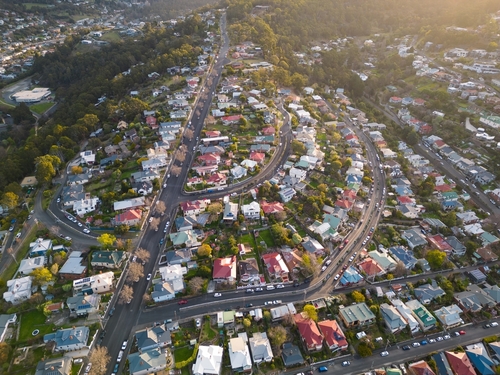GameStop Stock Is Tumbling
Because its earnings report mattered after all.
GameStop stock was falling fast on Wednesday after the company’s fiscal fourth-quarter results disappointed analysts. There’s also another elephant in the room: The company is considering selling more stock, which could dilute its shares.
GameStop stock (ticker: GME) closed down 33.8%, at $120.34. The S&P 500 index fell 0.6%, while the Dow Jones Industrial Average ended flat.
In a filing with the Securities and Exchange Commission, GameStop said it has been evaluating whether or not to increase the size of its previously announced $100 million at-the-market stock-sale program. The company had announced the ATM program in December, with Jefferies acting as the sales agent. The company said it didn’t sell stock as its valuation surged.
GameStop stock received a mix of downgrades, price target cuts, and raises from analysts following the report. “Many on Wall Street have wondered why GameStop has not done an ATM transaction to take advantage of the elevated share price,” Telsey Advisory Group analyst Joseph Feldman wrote. “The answer may be that its balance sheet is in great shape, with cash and cash equivalents of $635MM (incl. restricted cash of $110MM) and debt of $363MM at the end of 2020. The new commentary seems to be a signal that an ATM transaction could be on the way.”
Heading into Tuesday, Feldman had the highest price target listed by FactSet. He lowered his to $30 from $33, calling the event “anti-climactic.” On the flip side, Jefferies analyst Stephanie Wissink raised her target by 1,066% to $175. That’s the new Street-high, in case there was any doubt.
Wissink argued the moves by Chewy co-founder and GameStop board member Ryan Cohen to transform the company into more of a technology firm warrant a completely different valuation method. The company’s earnings release was paired with another trio of hires with e-commerce backgrounds, including Amazon alum Jenna Owens as its next chief operating officer.
Wissink wrote that she moved from basing her target on earnings before interest, taxes, depreciation, and amortization, or Ebitda, to a sales multiple that factors in a shift to e-commerce.
She also makes the point that GameStop has the potential to participate in the rise of non-fungible tokens, or NFTs, and the hosting of shoppable content streams.
“As a result, we expect store closures to persist & sales to transfer to dot com,” Wissink wrote. “Total revs may come down, but value per dollar of sales should increase if non-retail streams are realized.”
S&P Global Ratings analysts Mathew Christy and Andy Sookram wrote in a note on Wednesday that they believe the turnaround will involve sizable execution risks and possibly a material increase in its capital investment.”The recent increase and volatility in GameStop’s share price have not affected our fundamental view of its business or the risks the company faces,” they wrote. “However, we note the potential financial flexibility afforded by its improved equity market standing if it chose to raise additional capital to reposition its business or reduce its debt.”
BofA Global Research analyst Curtis Nagle maintained his $10 price objective and Underperform rating. He notes that while GameStop’s adjusted earnings per share of $1.34 beat his estimate for $1.22, he notes that the beat was driven by a large tax credit during the quarter. The company’s Ebitda came in short of his expectations by 66%.
“We continue to be very sceptical on GME’s efforts to address its long standing issue of digital disintermediation and the fact that its core market in new and pre-owned physical console gaming is shrinking at a rapid pace,” Nagle added. “GME also called out leveraging its existing digital assets like its PowerUp rewards program but this has seen declining engagement for years.”
Wedbush analyst Michael Pachter lowered his rating on GameStop to Underperform from Hold, but raised his price target to $29 from $16. While he still thinks GameStop is well-positioned to benefit from the new consoles from Sony and Microsoft, he says the short squeeze has spiked the stock to “levels that are completely disconnected from the fundamentals of the business.”
“Our downgrade isn’t a reflection of our opinion of company management, which remains very high; rather, it appears that the ‘real’ value of GameStop shares (the price willing buyers are prepared to pay in the open market) vastly exceeds the ‘fundamental’ value we believe investors expecting a financial return can reasonably expect,” he wrote.
Reprinted by permission of Barron’s. Copyright 2021 Dow Jones & Company. Inc. All Rights Reserved Worldwide. Original date of publication: March 24, 2021
 Copyright 2020, Dow Jones & Company, Inc. All Rights Reserved Worldwide. LEARN MORE
Copyright 2020, Dow Jones & Company, Inc. All Rights Reserved Worldwide. LEARN MORE
This stylish family home combines a classic palette and finishes with a flexible floorplan
Just 55 minutes from Sydney, make this your creative getaway located in the majestic Hawkesbury region.
Continued stagflation and cost of living pressures are causing couples to think twice about starting a family, new data has revealed, with long term impacts expected
Australia is in the midst of a ‘baby recession’ with preliminary estimates showing the number of births in 2023 fell by more than four percent to the lowest level since 2006, according to KPMG. The consultancy firm says this reflects the impact of cost-of-living pressures on the feasibility of younger Australians starting a family.
KPMG estimates that 289,100 babies were born in 2023. This compares to 300,684 babies in 2022 and 309,996 in 2021, according to the Australian Bureau of Statistics (ABS). KPMG urban economist Terry Rawnsley said weak economic growth often leads to a reduced number of births. In 2023, ABS data shows gross domestic product (GDP) fell to 1.5 percent. Despite the population growing by 2.5 percent in 2023, GDP on a per capita basis went into negative territory, down one percent over the 12 months.
“Birth rates provide insight into long-term population growth as well as the current confidence of Australian families,” said Mr Rawnsley. “We haven’t seen such a sharp drop in births in Australia since the period of economic stagflation in the 1970s, which coincided with the initial widespread adoption of the contraceptive pill.”
Mr Rawnsley said many Australian couples delayed starting a family while the pandemic played out in 2020. The number of births fell from 305,832 in 2019 to 294,369 in 2020. Then in 2021, strong employment and vast amounts of stimulus money, along with high household savings due to lockdowns, gave couples better financial means to have a baby. This led to a rebound in births.
However, the re-opening of the global economy in 2022 led to soaring inflation. By the start of 2023, the Australian consumer price index (CPI) had risen to its highest level since 1990 at 7.8 percent per annum. By that stage, the Reserve Bank had already commenced an aggressive rate-hiking strategy to fight inflation and had raised the cash rate every month between May and December 2022.
Five more rate hikes during 2023 put further pressure on couples with mortgages and put the brakes on family formation. “This combination of the pandemic and rapid economic changes explains the spike and subsequent sharp decline in birth rates we have observed over the past four years,” Mr Rawnsley said.
The impact of high costs of living on couples’ decision to have a baby is highlighted in births data for the capital cities. KPMG estimates there were 60,860 births in Sydney in 2023, down 8.6 percent from 2019. There were 56,270 births in Melbourne, down 7.3 percent. In Perth, there were 25,020 births, down 6 percent, while in Brisbane there were 30,250 births, down 4.3 percent. Canberra was the only capital city where there was no fall in the number of births in 2023 compared to 2019.
“CPI growth in Canberra has been slightly subdued compared to that in other major cities, and the economic outlook has remained strong,” Mr Rawnsley said. “This means families have not been hurting as much as those in other capital cities, and in turn, we’ve seen a stabilisation of births in the ACT.”
This stylish family home combines a classic palette and finishes with a flexible floorplan
Just 55 minutes from Sydney, make this your creative getaway located in the majestic Hawkesbury region.






















